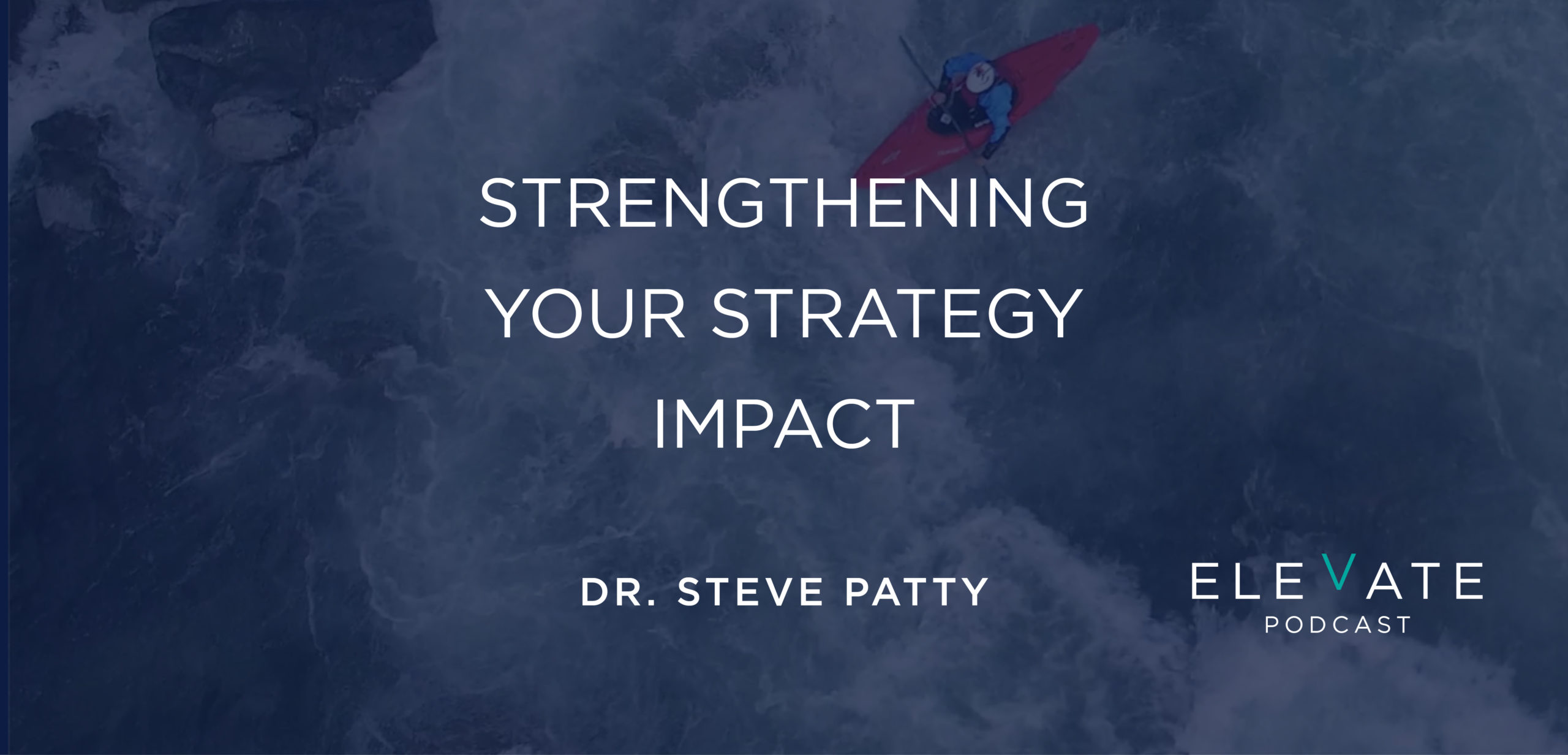In this episode of the Elevate podcast we hear from Dr Steve Patty as he highlights two important aspects of organisational health, namely Strategy and Evaluation. His passion is to invest in people’s development – a pursuit he considers to be ‘one of life’s greatest joys and most sober responsibilities’. Through his consulting firm, Dialogues in Action, Steve is dedicated to helping people and organisations evaluate their impact, multiply their influence through leadership, and design strategies to make progress on their mission.
People often think about Strategy and Evaluation as separate ‘events’. Leaders would typically set a day aside to focus on strategic planning at the start of a project or initiative and, once the project is wrapped up, they conclude that a report is needed for funders, boards or other stakeholders to evaluate the impact.
‘It becomes a once or twice-a-year event and when it’s done, people often stop thinking strategically and evaluatively,’ explains Steve. He instead encourages teams to make Strategy and Evaluation part of their culture so that they continually think strategically, pay close attention to the difference they are making, and continuously consider what adjustments are necessary to have even greater impact. ‘This creates a culture of learning, instead of just a couple of events on Strategy and Evaluation,’ notes Steve.
Connecting the dots between Strategy and Evaluation
Strategy and Evaluation should be seen as two symbiotic processes that work interdependently to achieve an outcome. Evaluation comes before Strategy, but it also embeds it at every stage of the organisation’s life cycle.
Drawing from his consultancy experience, Steve adds: ‘Think of Evaluation as a disciplined way of paying attention to people. It’s a kind of reflection and awareness concerning the people God has entrusted to leaders to serve. Good evaluation is about asking the questions, ‘How are people doing? Are they growing? Are they walking with the Lord in ways that are richer and fuller?’ As we commit to this kind of introspection, we shape our strategy accordingly and cultivate a culture of inquisitive learning.
Honest evaluation
‘It takes courage to evaluate honestly,’ says Steve, ‘and to shift the spotlight off us and onto the people that God has given us to serve, to ask ‘how are they doing?’
As you ask questions about people, try to pay attention to how it is affecting their mind, behaviour and emotions. ‘You can learn a lot by asking those kinds of questions, by listening carefully and asking for the Lord’s guidance and discernment as the spotlight’s on them. Remember that you’re not asking them what they’re thinking about your programme, but rather how they are doing as a result of it,’ says Steve.
Tips on strategy execution
Of course it’s one thing to commit your strategy to paper, it’s yet another to systematically execute this strategy. Leaders may have the best of intentions but faced with the multiple and ongoing demands of running an organisation, may often fail to implement their intended plan and vision.
‘A helpful mental model that takes a lot of pressure off,’ notes Steve, ‘is to think about Strategy in an experimental way.’ He explains that the pull of the status quo is usually so strong that it can be overwhelming to just do everything in one big move. Instead, he advises, think of making small incremental changes to your current systems or behaviours. You don’t have to overhaul a project or introduce a brand new programme. Rather make small-scale adaptations that can generate new data and begin to shift your strategy in a different direction. ‘Make a point to then debrief those experiments and before you know it, you’ve got momentum going in that direction,’ he says. He reminds us that experimentations should take place within the context of operations, but never with people. ‘Yes, your programme and strategy does impact people,’ says Steve, ‘but this mindset pulls the experimentation back on you instead of too much on others.’
Three questions to help grow your strategy
Steve shares three simple yet highly effective questions for leaders who want to grow their skills in Strategy and Evaluation:
- What is currently working well in your strategy approach? What are those things you must not lose, even when changes or adjustments are needed?
- What is currently not working in your organisation? Where are there redundancies, inefficiencies or old practices that have inhibited growth or stifled creativity? What are the things that are holding you back, not only from good strategy, but good development? Now may be a good time to let them go.
- What new capacities are being required of you, given the needs of people around you as well as what God is calling you to?
To have maximum impact, Strategy and Evaluation needs to becomes part of an organisation’s culture. Leaders also need to have the courage to evaluate honestly, ask the right questions, and to humbly assess whether the hard work is truly having the desired impact. It will not happen overnight, but through careful and ongoing application, your organisation will develop healthy rhythms for Strategy and Evaluation and unlock its dynamic future.
To learn more strengthening your strategy for impact, listen to the full podcast here.
The Elevate Leadership podcast series is also available on all other major podcasting platforms such as Apple, Google, Overcast and YouTube.
